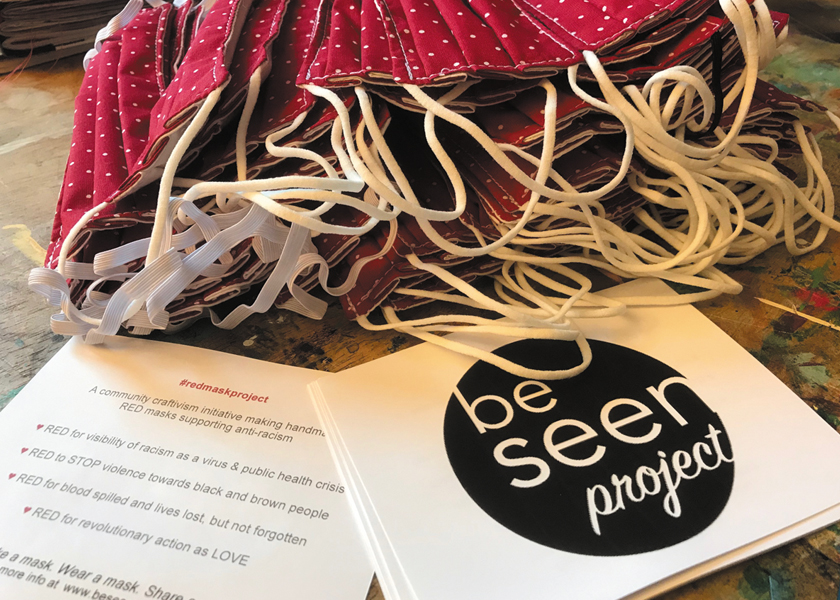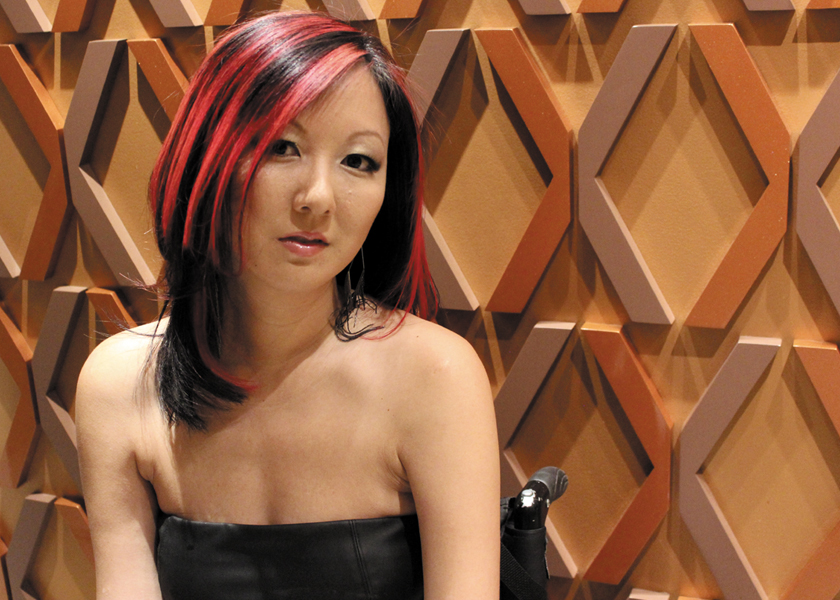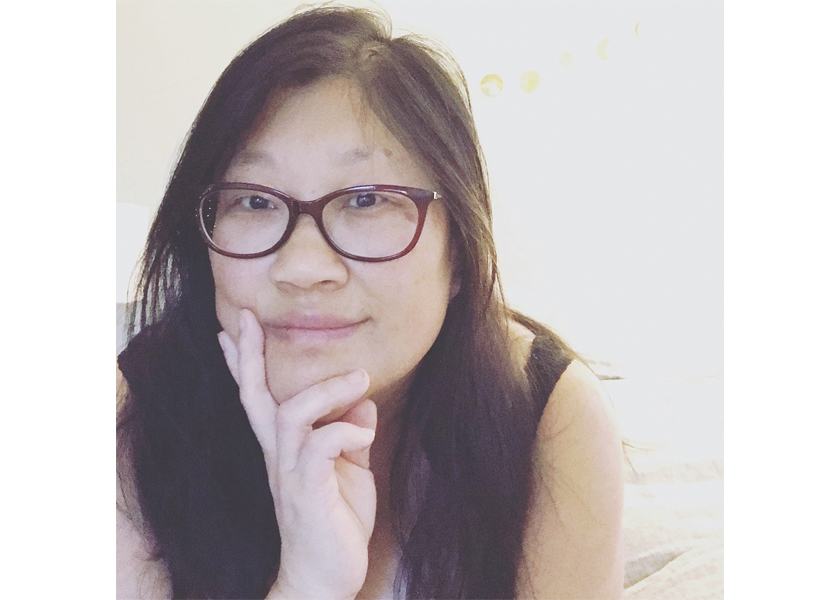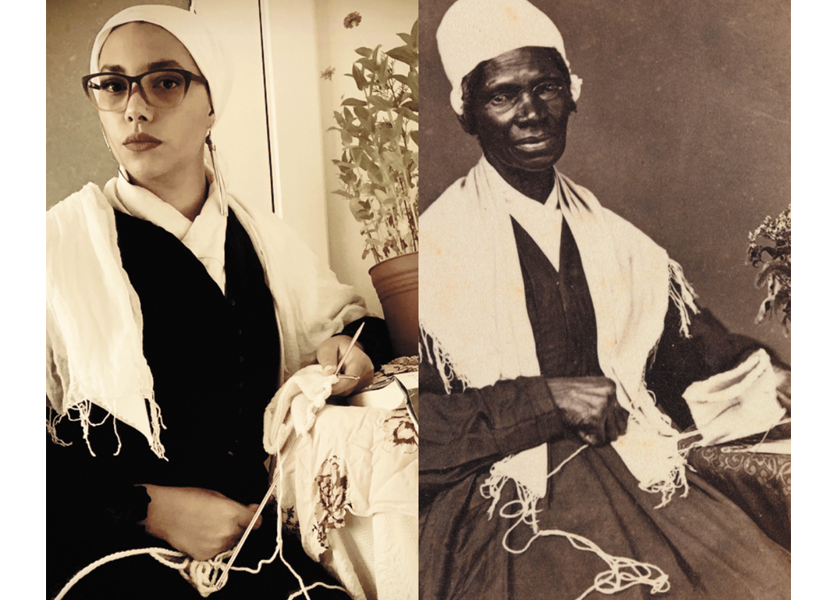Mindy Tsonas Choi creates the Be Seen Project, an online space for artists of color working for social justice | By Martha Vickery (Winter 2021 issue)

An artist is, at the most basic, a master questioner and problem-solver, and Mindy Tsonas Choi has demonstrated that mix of skill and talent in creating the Be Seen Project. It is a website devoted to the work of artists of color who are using art to speak for the marginalized and create cultural change.
The site provides a short introduction to each artist, with clickable links to their work. By design, the participating artists and crafters are Black, indigenous, and other people of color (BIPOC), working in media ranging from knitting to photography. Their work is unified in one characteristic – using art in the cause of social justice.
For example, the interactive I’m Tired Project invites people of color to submit photos of their bare backs or hands, with a message written on their skin of what they are tired of. “I’m tired of mourning my people,” is a message on one Black woman’s back in a black-and-white photo.
Other projects invite participation in a charitable cause, such as the Knit the Rainbow project, which collects knitted garments and donates them to LGBTQ homeless youth. Knitters can participate by donating garments and also by knitting or crocheting tiny heart tags for the clothes, to remind recipients that someone cares.

Choi is passionate about articulating the project mission. To that end, the Be Seen Project also has a spin-off quarterly newsletter Brave Space + Being Seen, which reports on where Be Seen Project fundraising is going, among other topics. There is also the Be Seen Podcast, in which Choi discusses art more in depth with guest artists, exploring how “it is not just the artist and what they make, but the complexities of their lives and marginalization, and how that formed their work and how that shapes them as people.”
The idea of art as a change agent is central to the project. Choi has recently revised the mission statement to read, in part: “The creative process is inherently revolutionary. It reflects culture, invites engagement, archives history, builds relationship, and shares visions and narratives that can confront social systems in a powerful way when used as a tool for change.”
The Be Seen Project may not have happened without the pandemic. Until March, Choi, who lives in northeastern Massachusetts with her husband and two sons, was working as the executive director of a program that organized artist’s retreats at a camp. The job folded, and so did the company, due to the lockdown.
Be Seen emerged, she said. In the void of job loss, lockdown, “beginning to process the idea that racial inequities were being exposed, and Asian Americans attacked by the president around the origin of this virus. …It was one of those moments where I knew I was ready to take action but not knowing what exactly that would be.”

In addition to all of that, Choi is a Korean adoptee, and had begun a birth family search in early 2020, “and it has been a very long, winding road to get to that decision, and take the leap,” she said.
Back in 2015, she had “scribbled some notes” about the importance of being seen as an artist of color, and had thought about a future project in connection with that idea. It was never the right time. She describes her own realization that she wanted to “decolonize my own self from white communities and whiteness. Not the color of peoples’ skin but the systems of oppression she was living inside and sort of bound by, unknowingly.”
Choi said she realized she could not lead a project so “direct and sometimes confrontational” unless she had worked on herself first. “But as we came into 2020, it all magically sort of became the right time. The work met the moment, and the moment met the work.”
One extra shot of kismet came when she was about to go live with the site – it was the day George Floyd was murdered. “Like so many people, I had a such a visceral response to that event.” It quickly became clear to her that part of the mission had to be about “making an impact in the realm of human rights and making a change for equity and justice.”
Choi wondered about the structure her future artists’ site, and what would happen if she built a BIPOC community from the ground up. Would it operate differently? Would it be more equitable than other ad-hoc arts-oriented communities she had known? Her conclusion so far “It is so much simpler to build something new that has diversity, equity and inclusion in its DNA than to turn something predominantly white into something more diverse, because of the culture it is built upon.”

Be Seen Project’s structure has also pushed against conventional art economics, not necessarily promoting the successful, but raising up less-well-known artists whose work deserves attention. Her first “micro-grant” went to Be Seen artist Darcy Kern for her photo project Knitting While Black. Choi has been collecting donations for micro-grants and other supportive donations by making art pieces for sale, and developing some sponsors who wish to support the project.
Identity is also a huge part of Choi’s work. “It probably has a lot to do with my being a Korean adoptee. I’m always curious about the intersection of all of our different identities and how that informs what we make in the world.” A new podcast about to drop at the time of the interview is of Korean adoptee who is an industrial artist involved in “creating tools for people with differently-abled needs,” she said.
Choi often deals with questions about why she has not contributed art to the project. There is a value she treasures in saving that public face for others. “I wanted to create the space, and create the resources, and pass the torch,” she said. “We lean so heavy on and really validate individualism, that as soon as we want to talk about something more collective, that doesn’t have ownership, I think it short-circuits people’s brains a little bit. It is a kind of culture, and I am pushing also against that culture by not having myself in the project.” In other words, she said, “It’s not the Mindy Show!”
Also Check out Mindy Tsonas Choi’s essay: On Race and Belonging, Reclaiming my Korean Self that appeared in the Summer 2020 issue of Korean Quarterly.


